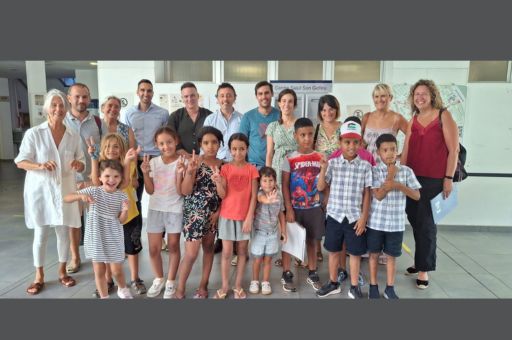This group of children is part of a total of 36 coming from the Tindouf refugee camps (Algeria).
Primary Care of Mallorca is carrying out health check-ups for thirteen Sahrawi children aged 8 to 10 who are visiting the Balearic Islands for the first time under the “Holidays in Peace” program. This initiative has been running for over 30 years in the Balearic Islands and is part of a direct cooperation and humanitarian aid agreement promoted by the Government of the Balearic Islands and the Friends of the Sahrawi People Association.
TDB keeps you informed. Follow us on: Facebook, Twitter and Instagram
Primary Care of Mallorca Conducts Health Check-Ups for 13 Sahrawi Children Welcomed for the First Time by Families in the Balearic Islands
This group is part of a total of 36 children from the Tindouf refugee camps in Algeria who will spend two summer months with host families across the islands: 28 in Mallorca, 5 in Menorca, and 3 in Ibiza.
Initial Health Screenings
This afternoon, the pediatric team at the Son Gotleu Health Center performed health check-ups on children visiting for the first time, while those who have already participated in previous editions of the program —and have an existing medical record— receive their check-ups at the health center corresponding to their host family’s residence.
One of the main objectives is to detect diseases that can be treated during their stay. These screenings help standardize and streamline medical care for children who live in refugee camps with limited healthcare resources, high prevalence of certain diseases, and poor, low-calorie diets.
Health Assessments and Common Conditions
The medical team, composed of pediatric and nursing staff, conducts anamnesis (clinical interview and information gathering) and pediatric examinations. Depending on the results, diagnoses are made and appropriate treatments are recommended.
- All first-time children undergo blood tests, and when necessary, they are referred to specialists to address health issues promptly.
- Each child is registered and assigned a medical record for follow-up.
Common health conditions identified include:
- Chronic malnutrition (low height for age)
- Anemia
- Dental fluorosis and cavities
- Refractive vision problems
- Cryptorchidism and hernias
- Goiter (thyroid enlargement due to high iodine in water)
- Celiac disease
- Kidney stones (nephrolithiasis)
- Intestinal parasites, lice infestations, and skin diseases
Due to the high prevalence of kidney stones, all children undergo a simple urine test (dipstick) to detect abnormal blood presence in the urine. Parasitological studies are also requested when necessary.
Additional Ophthalmological and Dental Screenings
Eye examinations assess visual acuity and include follow-ups for children previously prescribed glasses. Dental check-ups identify tooth decay and malocclusion. These additional assessments are possible thanks to the collaboration of private institutions involved in the project.
Background on the Sahrawi Refugee Camps
The Sahrawi people have been living under harsh conditions in the Tindouf refugee camps for more than fifty years. This arid region endures extreme weather year-round, especially during summer. The poor-quality groundwater is unsuitable for consumption due to high salinity and contamination. Limited and unvaried food supplies —largely dependent on humanitarian aid— are the main causes of acute and chronic malnutrition among the camp’s population.
